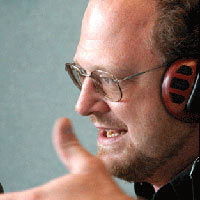The state Supreme Court race between incumbent Justice Louis Butler and Barnett County Judge Michael Gableman has predictably veered away from issues, since in a so-called non-partisan race it's hard to focus on how a justice would vote on a particular legal issue. It's also a race where both sides are at ideologically polar opposites.
Recent salvos include special interest advertisements that were so graphic TV stations pulled them from the air. One attacked Butler, claiming he set a murderer free and featured a dead body in a reenactment as part of the graphics. Another missive from a liberal group questions how Gableman even received his seat on the bench, since the standard procedure wasn't followed and Gableman had held two fundraisers for then Gov. Scott McCallum, who appointed him.
And now the conservative Wisconsin Club for Growth is trying to raise questions regarding Butler's travel to Nevada, where he regularly teaches judges. The group contends that Butler is "triple-dipping" in making his teaching travels by not only not officially taking time off to go there, it also contends that Butler should take sick leave to go. By not taking sick leave, Butler receives additional health care coverage when he retires.
It's kind of a strange attack, since Butler receives a salary and should be able to do what he wants on his days off. Does that mean he should take sick leave when lounging around on weekends? He took a week to teach in Nevada and a day in Los Angeles to attend a moot court competition for the California Law School.
"Louis Butler should immediately refund the taxpayers for the time they paid him while he was doing work for out-of-state organizations, or deduct the time from his accrued leave so taxpayers don't pay for it again when he retires," it said.
Other groups spending partisan cash on the race include Wisconsin Manufacturers and Commerce and the Greater Wisconsin Committee.
Snuffing Out the Smoking Ban: Somebody has finally taken up the banner for Wisconsin smokers in an attempt to fight a statewide smoking ban.
Calling itself "Dan the Ban Wisconsin" a duo of conservative bloggers has to put together a Web site (banthebanwisconsin.com) pointing out the other side of the smoking debate.
Joey Monson, of pheistyblog.com, and Ryan Evans, of arclightzero.wordpress.com, are the coordinators. They say they have no connection to big tobacco and will try to be objective and fair and feature one smoker and one non-smoker.
"Our resources include documents from pulmonologists, economists, physicians, labor safety organizations, lawyers and law professors, environmental safety scientists and a variety of peer-reviewed publications such as the British Medical Journal," says a statement.
"There is a human face to this issue that isn't being adequately addressed here. We hope to change that. The rural and out state Wisconsin community is rich in culture and community, and our goal in the coming weeks will be to visit with some of these people and tell their stories and document their views on Madison's attempt to force a state-wide smoking ban upon them."
The group was a recent guest of the Tavern League.
"People must realize that behind these ‘mom and pop' businesses are thousands of Wisconsinites' lives and legacies. It would be a shame to needlessly inflict harm on a single one of these people in the name of a skewed agenda," they said.
Dorinda Floyd, the city parking administrator, said that, overall, the LUKE machines work, despite complaints aldermen received regarding problems with receipt printing, the ability to see the screens on the machines, frozen keypads and confusion over parking stalls.
"We believe it's very successful but there have been some challenges," Floyd told the Public Works Committee.
She said there are about 20,000 transactions during the week on the meters and that the public likes the credit card feature, using it some 45 percent of the time. It's also a real time transaction, which sends money automatically to the city. "(Credit card use) has exceeded our expectations," she said.
Regarding receipt printing issues, Floyd said that option was wanted by the public, even though in an Oct. 16 response to a vendor bidding on the meters, the answer was, "The printer is optional. However, if a printer is included in the unit, a transaction should be able to be completed without a receipt being completed ... in the event of a jam or other printer malfunction."
Answering questions regarding glare that makes it difficult to read the machines' screens, Floyd told the committee and this column, "We are exploring options to correct this problem."
Because some of the screens failed during a recent cold spell and that they take some time to warm up when waking up from "sleep mode," the city parking office has decided to leave them turned on all the time.
As for contentions that the original bid required solar panels, about which at least two vendors have complained, suggesting that somehow the bid was changed, Floyd told the committee and this column that the bidding guidelines noted that solar was an "and / or" option and told the committee, "recharging off of lights poles wasn't in the specifications, it's something we decided to go to," she told the committee.
She added in a letter to this column that the city saved some $55,000 by not using solar panels for the 103 LUKE meters and that the power will cost about $1,000 a year to charge batteries in the meters.
In other points in her e-mail to this column, Floyd contends:
- * "In your article you state ‘after some modifications to the proposal, the city chose Digital Payment Technologies.' Typically, in an RFP process addendums are issued to clarify provisions or to correct errors or omissions. Five addendums were issued for this RFP."
- "In your article you alleged that ‘one vendor filed a formal complaint to the city about its process, especially since at the time it was the only bidder on the project.' The city received six proposals of which four were selected as finalists. Further, we are not aware of any formal complaint filed. We received some emails and letters from vendors after the winning vendor was announced and we responded to their questions accordingly.'
In a complaint dated Oct. 16, 2006 to the city's waste, fraud and abuse hotline that "one vendor," TAPCO, complained that the bidding guidelines were so specific as to favor one company, accusing the DPW of "slanting" the bid with "proprietary specifications." The complaint also noted that the bid required no performance bond to protect the city in case the things didn't work, "highly unusual with so much money on the line," it reads, "why would the city do such a thing?"
An avid outdoors person he regularly takes extended paddling trips in the wilderness, preferring the hinterlands of northern Canada and Alaska. After a bet with a bunch of sailors, he paddled across Lake Michigan in a canoe.
He lives in Bay View.




